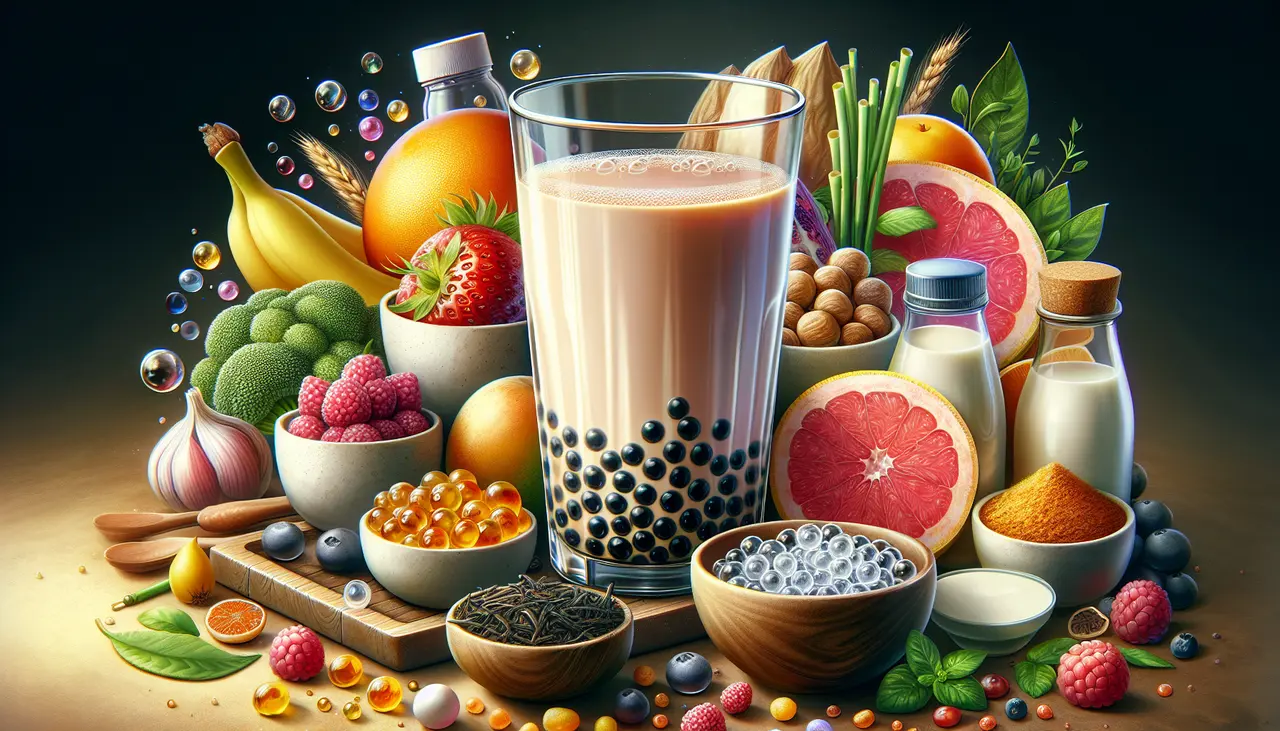Introduction to Boba Milk Tea
Boba milk tea, often just called boba tea, is a drink that’s gained massive popularity worldwide. Originating from Taiwan in the 1980s, this beverage combines milk tea with chewy tapioca pearls, which is where it gets the “boba” name. Over the years, boba tea has evolved, and now you can find it in a plethora of flavors, including fruit-infused teas and even versions without tea for a caffeine-free option. While traditional boba milk tea is a mix of black tea, milk, sugar, and tapioca pearls, many shops offer customization options to suit all taste preferences. From choosing the type of tea to adjusting the sweetness and ice levels, boba milk tea can be tailored just for you. What was once a local Taiwanese treat has transformed into a global sensation, inviting everyone to try a sip of its unique, creamy, and chewy experience.
Nutritional Components of Boba Milk Tea
Boba milk tea, often sweet and creamy, seems like just a tasty treat, but it does pack some nutritional punches thanks to its main components. First up, the base – tea. Tea, either black or green, is loaded with antioxidants. These antioxidants can fight off harmful free radicals, potentially lowering your risk of some diseases. Next, the milk – adding a dose of calcium and protein, essential for healthy bones and muscles. However, the star of the show, boba pearls, are primarily tapioca, offering a carbohydrate boost for quick energy. But brace yourself, this energy comes with a calorie count. Boba milk tea can be high in sugar and calories, making it more of a sometimes food than an everyday drink. Keep this in balance, and you can enjoy the occasional boba with a little less guilt.
Boosting Energy Levels with Boba Milk Tea
Boba milk tea isn’t just a delightful treat; it’s also known for giving a quick energy boost. This comes from the tea and the sugar content. Most boba teas are made with black or green tea, both of which contain caffeine. A typical cup can offer a jolt similar to a cup of coffee, depending on how it’s brewed. But, let’s not forget the sugar. While it might not be the healthiest energy source, the sugar in the boba milk tea provides a rapid increase in energy levels. So, next time you’re feeling a bit sluggish, remember that a sip of boba milk tea might just be the pick-me-up you need. However, enjoy responsibly since it’s also packed with calories.
Potential Antioxidant Benefits
Boba milk tea isn’t just a tasty treat; it’s also packed with potential health benefits thanks to its tea base. Most boba is made with black or green tea, both known for their high antioxidant levels. Antioxidants are like your body’s personal defense team against damage from free radicals – harmful molecules that can mess with your cells. By fighting off these free radicals, antioxidants in boba tea can help protect your body from certain diseases and even slow down signs of aging. Remember, while boba can be a fun addition to your diet, it’s best enjoyed in moderation due to its high sugar content. So next time you’re sipping on boba milk tea, give a little nod to the antioxidants working hard in every gulp.
Calcium and Bone Health Advantages
When you think of boba milk tea, the tiny, chewy pearls probably come to mind first. But beyond its delicious taste, this popular drink can pack a punch for your bones. Boba milk tea has a decent amount of calcium, especially when you choose milk or creamer-based options. Calcium is a key player in maintaining strong bones and teeth. It’s involved in bone metabolism and helps in the prevention of osteoporosis, a condition where bones become weak and fragile. Each serving can contribute to your daily calcium intake, making it a tasty way to support bone health. Just remember, while boba milk tea can be a source of calcium, balance is key. Too much sugar from regular boba indulgence might offset these benefits, so enjoy it in moderation and consider less sugary alternatives.
Digestive Health and Boba Milk Tea
Boba milk tea might not be the first thing you think of for gut health, but there’s a twist. The tapioca pearls, or boba, are made from cassava root, rich in resistant starch. This type of starch isn’t digested in the small intestine, meaning it heads straight to the large intestine, where it serves as food for your good bacteria. Feeding these bacteria helps keep your gut in check and can improve overall digestion. Remember, moderation is key. While a cup of boba milk tea now and then can add some resistant starch to your diet, the high sugar content in many boba teas can tip the scales in the wrong direction. Stick to less sweet options and enjoy the potential digestive benefits without overdoing it.
Boba Milk Tea: A Stress-Reducing Beverage?
Is boba milk tea a drink that can actually help you relax? It might sound surprising, but some people swear by its stress-reducing powers. Let’s break it down. First off, boba milk tea, also known as bubble tea, is a mix of tea, milk, and those chewy tapioca balls at the bottom. Now, tea itself has been shown to reduce stress levels, thanks to a little thing called theanine. This amino acid promotes relaxation without making you drowsy. While the sugar and caffeine in boba might give you an initial energy boost, it’s the theanine in the tea that could help you chill out. So, next time you’re feeling the pressure, a cup of boba milk tea might just be what you need to ease those stress vibes. Just remember, it’s all about balance. Drinking boba tea can be a sweet treat and a way to unwind, as long as you’re not relying solely on it to keep your stress in check.
Weight Management and Boba Milk Tea: Understanding the Impact
Boba milk tea might seem like a fun treat, but when it comes to weight management, you’ve got to keep an eye on it. A regular cup of this sweet drink can pack more calories than you think, often because of the sugar and creamy ingredients added to give it that delicious taste. Here’s the deal: a single serving can have anywhere from 200 to 450 calories, depending largely on the size and what extras you put in it, like sugar, syrups, and toppings. For context, an apple has about 95 calories. So, sipping on a boba milk tea could be almost like eating four apples in one go! If you’re watching your weight or trying to keep it in check, think about these points. Go for smaller sizes, ask for less sugar, or even better, pick healthier substitutes if they’re available. Boba milk tea doesn’t have to be off-limits, but knowing what’s in your cup can help you make choices that align with your health goals.
How Much Boba Milk Tea Should You Drink?
Boba milk tea, with its sweet taste and fun, chewy tapioca pearls, has won hearts worldwide. But here’s the deal: Moderation is key. Although boba can be a delightful treat, it’s not exactly a health drink. A typical 16-ounce serving can pack in about 300 to 400 calories, mostly from sugar and carbs. So, how much should you sip on? Aim for once a week as a treat, rather than a daily habit. And when you do indulge, consider choices like opting for less sugar or skipping the extra toppings to cut down on those sneaky calories. Remember, enjoying boba milk tea is all about balance. Keep it as an occasional delight, and you’re good to go.
Making Healthier Choices with Boba Milk Tea
Boba milk tea can be a sweet treat, but it’s also known for being high in calories and sugar. But, don’t worry, you can still enjoy it by making healthier choices. First, opt for less sweet or no sugar options when they’re available. Many shops let you customize the sweetness level. Second, choose almond or soy milk over regular milk for a lower-calorie option. Third, think about skipping the toppings or picking something light like aloe vera instead of the tapioca pearls. Remember, enjoying boba milk tea in moderation and making these healthier choices can help you indulge without overdoing it.








Leave A Comment